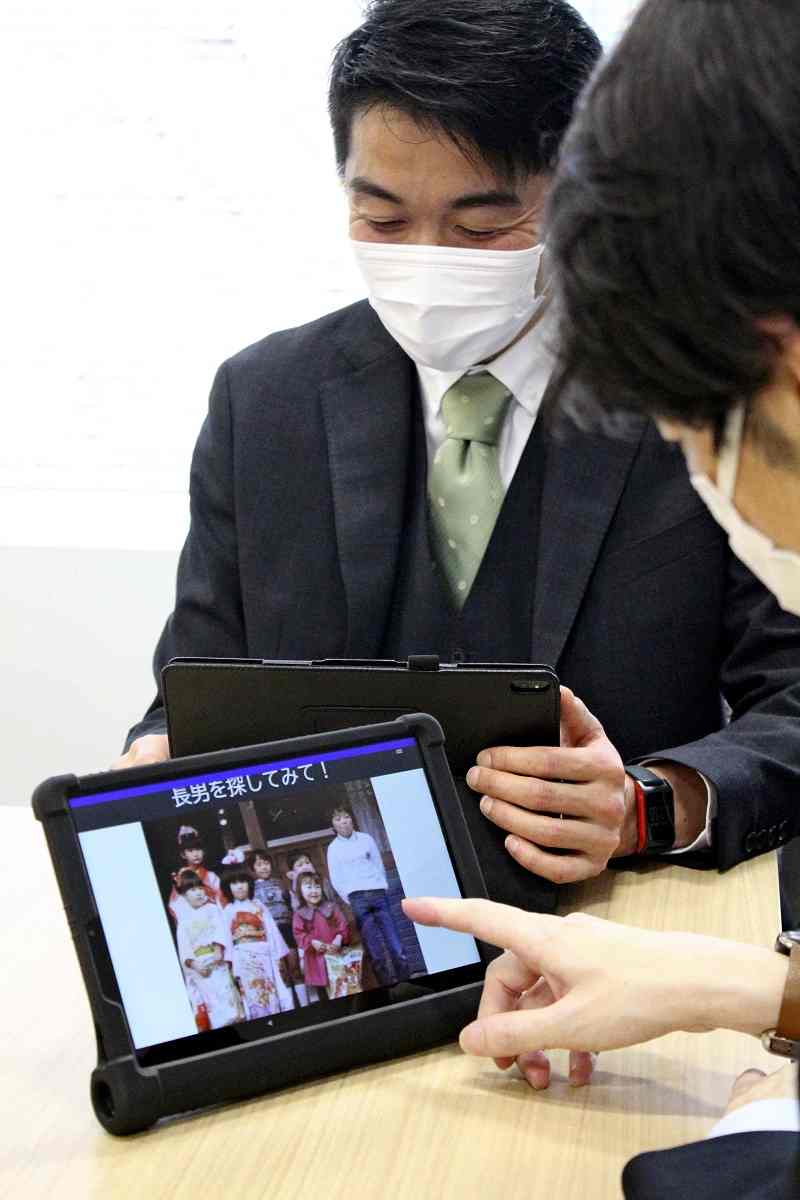
A man points at a tablet showing a product developed to alleviate dementia symptoms.
14:45 JST, May 15, 2022
Pharmaceutical companies are starting to embrace the novel concept of “digital therapy,” where artificial intelligence and virtual reality technologies are employed in the treatment of diseases.
As the efficacy of some digital technologies has been demonstrated in helping improve patients’ awareness or lifestyle and treating some diseases, expectations are high for such a “third treatment” method to go along with drugs and surgery.
The development of relevant software and apps is accelerating toward the practical application of the products.
Treatment of dementia
A Yokohama-based start-up recently developed software to reduce anxiety and alleviate symptoms of dementia by exposing patients to familiar images and music. Photos of family members, seasonal scenes or news videos, for example, are shown to the patients on tablet devices along with music.
Each time a patient views an image, the AI automatically changes the combination of photos and videos while monitoring the patient’s reactions using the tablet’s camera. The program then creates a video that will produce the most effective memory reactions for the patient’s dementia treatment.
The developer, Aikomi Ltd., is a company 33% owned by drugmaker Sumitomo Pharma Co. The product is being marketed for use in nursing care on a trial basis, but Aikomi aims to commercialize it for medical purposes in fiscal 2027 at the earliest.
“The advancement of digital therapy may make it possible to treat diseases that cannot be cured with conventional medicine,” said Seiji Hori of Sumitomo Pharma.
Treatment using computer software, including smartphone applications, is expected to be effective in treating depression, addiction and other mental illnesses. Digital therapy is also highly compatible with the treatment of diabetes and hypertension, which require lifestyle improvements.
Prescription by doctors
Unlike general health apps, digital therapy is intended to be used as part of treatment by a doctor. In order to bring it into practical use, the effectiveness and safety of the treatment must be verified in clinical trials and approved by the Health, Labor and Welfare Ministry. It then will be covered by the public medical insurance program and prescribed by physicians, much like medicine.
In Japan, an app developed by CureApp Inc., a Tokyo-based start-up, to treat nicotine dependence has been authorized for use as a medical device. The Japanese Circulation Society recommends it as a standard treatment for nicotine dependence.
The development of new pharmaceuticals usually requires more than 10 years and tens of billions of yen in funding, but software and applications can be developed in a few years and cost only a few hundred million to a few billion yen.
Some predict that the global market for digital therapy will reach ¥4 trillion by 2030.
For this reason, pharmaceutical companies, positioning digital therapy as a growth area, are promoting the development of related products by collaborating with start-ups strong with information technology.
In December, Shionogi & Co. entered into an agreement with Tokyo-based Susmed Inc., a developer of a therapeutic application for insomnia, to exclusively market the app in Japan.
Otsuka Pharmaceutical Co. also partnered with Jolly Good Inc. in Tokyo in January to jointly develop a product using virtual reality for the treatment of mental disorders.
Challenges
The United States is leading the way in digital therapy, with the world’s first approval of an app for the treatment of diabetes in 2010. Apps to treat attention deficit hyperactivity disorder and drug addiction have also been put into practical use.
Germany has a system in which digital therapy is approved through a simplified procedure compared to general medicine. This is because digital therapy is unlikely to cause side effects, and patients can assess their effectiveness while using them.
In Japan, a law on pharmaceuticals and medical devices that came into effect in 2014 made apps eligible as medical devices.
There is a growing momentum to introduce digital therapy since the Japan Digital Health Alliance was established in March as an industry group for companies seeking to promote the therapy.
Top Articles in Business
-

Prudential Life Insurance Plans to Fully Compensate for Damages Caused by Fraudulent Actions Without Waiting for Third-Party Committee Review
-

Narita Airport, Startup in Japan Demonstrate Machine to Compress Clothes for Tourists to Prevent People from Abandoning Suitcases
-

Asics Opens Factory for Onitsuka Tiger Brand in Western Japan
-

JR Tokai, Shizuoka Pref. Agree on Water Resources for Maglev Train Construction
-

KDDI Opens AI Data Center at Former Sharp Plant in Osaka Prefecture; Facility Will Provide Google’s Gemini AI Model for Domestic Users
JN ACCESS RANKING
-

Japan Institute to Use Domestic Commercial Optical Lattice Clock to Set Japan Standard Time
-

Israeli Ambassador to Japan Speaks about Japan’s Role in the Reconstruction of Gaza
-

Man Infected with Measles May Have Come in Contact with Many People in Tokyo, Went to Store, Restaurant Around When Symptoms Emerged
-

China Eyes Rare Earth Foothold in Malaysia to Maintain Dominance, Counter Japan, U.S.
-

Prudential Life Insurance Plans to Fully Compensate for Damages Caused by Fraudulent Actions Without Waiting for Third-Party Committee Review
























